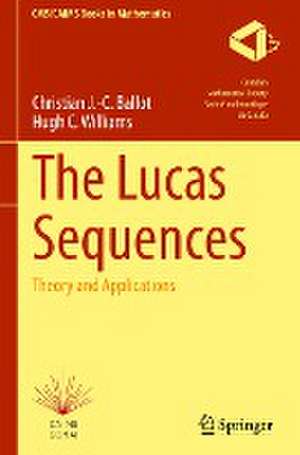The Lucas Sequences: Theory and Applications: CMS/CAIMS Books in Mathematics, cartea 8
Autor Christian J.-C. Ballot, Hugh C. Williamsen Limba Engleză Hardback – 20 oct 2023
Although the Lucas sequences were known to earlier investigators such as Lagrange, Legendre and Genocchi, it is because of the enormous number and variety of results involving them, revealed by Édouard Lucas between 1876 and 1880, that they are now named after him. Since Lucas’ early work, much more has been discovered concerning these remarkable mathematical objects, and the objective of this book is to provide a much more thorough discussion of them than is available in existing monographs. In order to do this a large variety of results, currently scattered throughout the literature, are brought together. Various sections are devoted to the intrinsic arithmetic properties of these sequences, primality testing, the Lucasnomials, some associated density problems and Lucas’ problem of finding a suitable generalization of them. Furthermore, their application, not only to primality testing, but also to integer factoring, efficient solution of quadratic and cubic congruences, cryptography and Diophantine equations are briefly discussed. Also, many historical remarks are sprinkled throughout the book, and a biography of Lucas is included as an appendix.
Much of the book is not intended to be overly detailed. Rather, the objective is to provide a good, elementary and clear explanation of the subject matter without too much ancillary material. Most chapters, with the exception of the second and the fourth, will address a particular theme, provide enough information for the reader to get a feel for the subject and supply references to more comprehensive results. Most of this work should be accessible to anyone with a basic knowledge of elementary number theory and abstract algebra. The book’s intended audience is number theorists, both professional and amateur, students and enthusiasts.
Preț: 897.33 lei
Preț vechi: 1094.30 lei
-18% Nou
Puncte Express: 1346
Preț estimativ în valută:
171.76€ • 186.63$ • 144.37£
171.76€ • 186.63$ • 144.37£
Carte tipărită la comandă
Livrare economică 21 aprilie-05 mai
Preluare comenzi: 021 569.72.76
Specificații
ISBN-13: 9783031372377
ISBN-10: 3031372379
Pagini: 301
Ilustrații: XVIII, 301 p. 3 illus.
Dimensiuni: 155 x 235 mm
Greutate: 0.63 kg
Ediția:1st ed. 2023
Editura: Springer International Publishing
Colecția Springer
Seria CMS/CAIMS Books in Mathematics
Locul publicării:Cham, Switzerland
ISBN-10: 3031372379
Pagini: 301
Ilustrații: XVIII, 301 p. 3 illus.
Dimensiuni: 155 x 235 mm
Greutate: 0.63 kg
Ediția:1st ed. 2023
Editura: Springer International Publishing
Colecția Springer
Seria CMS/CAIMS Books in Mathematics
Locul publicării:Cham, Switzerland
Cuprins
1. Introduction.- 2. Basic theory of Lucas sequences.- 3. Applications.- 4. Further Properties.- 5. Some Properties of Lucasnomials.- 6. Cubic Extensions of the Lucas Sequences.- 7. Linear Recurrence Sequences and Further Generalizations.- 8. Divisibility Sequences and Further Generalizations.- 9. Prime Density of Companion Lucas Sequences.- 10. Epilogue and Open Problems.
Notă biografică
Dr. Hugh Williams is internationally recognized as an expert in computational number theory and its applications to cryptography. He has authored over 150 refereed journal papers, 30 refereed conference papers and 20 books or book chapters. After a university career of 46 years, he was appointed Professor Emeritus in Mathematics and Statistics at the University of Calgary.
Dr. Christian Ballot was first trained as an engineer in France before studying mathematics in the US with a PhD thesis in Number Theory. He is currently Maître de Conférences at the University of Caen, Normandy. He has published about 700 pages of research papers in Arithmetic which include two memoirs of about 100 pages each.
Dr. Christian Ballot was first trained as an engineer in France before studying mathematics in the US with a PhD thesis in Number Theory. He is currently Maître de Conférences at the University of Caen, Normandy. He has published about 700 pages of research papers in Arithmetic which include two memoirs of about 100 pages each.
Textul de pe ultima copertă
Although the Lucas sequences were known to earlier investigators such as Lagrange, Legendre and Genocchi, it is because of the enormous number and variety of results involving them, revealed by Édouard Lucas between 1876 and 1880, that they are now named after him. Since Lucas’ early work, much more has been discovered concerning these remarkable mathematical objects, and the objective of this book is to provide a much more thorough discussion of them than is available in existing monographs. In order to do this a large variety of results, currently scattered throughout the literature, are brought together. Various sections are devoted to the intrinsic arithmetic properties of these sequences, primality testing, the Lucasnomials, some associated density problems and Lucas’ problem of finding a suitable generalization of them. Furthermore, their application, not only to primality testing, but also to integer factoring, efficient solution of quadratic and cubic congruences, cryptography and Diophantine equations are briefly discussed. Also, many historical remarks are sprinkled throughout the book, and a biography of Lucas is included as an appendix.
Much of the book is not intended to be overly detailed. Rather, the objective is to provide a good, elementary and clear explanation of the subject matter without too much ancillary material. Most chapters, with the exception of the second and the fourth, will address a particular theme, provide enough information for the reader to get a feel for the subject and supply references to more comprehensive results. Most of this work should be accessible to anyone with a basic knowledge of elementary number theory and abstract algebra. The book’s intended audience is number theorists, both professional and amateur, students and enthusiasts.
Caracteristici
Only book devoted exclusively to the Lucas sequences and their many properties Accessible to a variety of readers and introduces them to the vast literature Contains an extensive bibliography











